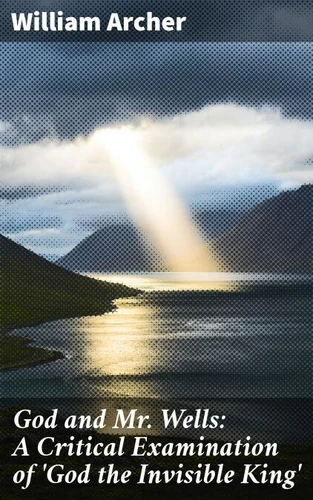God and Mr. Wells: A Critical Examination of 'God the Invisible King'. Unveiling the Philosophical Depths of a Literary Icon's Controversial Masterpiece
Par :Formats :
Disponible dans votre compte client Decitre ou Furet du Nord dès validation de votre commande. Le format ePub est :
- Compatible avec une lecture sur My Vivlio (smartphone, tablette, ordinateur)
- Compatible avec une lecture sur liseuses Vivlio
- Pour les liseuses autres que Vivlio, vous devez utiliser le logiciel Adobe Digital Edition. Non compatible avec la lecture sur les liseuses Kindle, Remarkable et Sony
 , qui est-ce ?
, qui est-ce ?Notre partenaire de plateforme de lecture numérique où vous retrouverez l'ensemble de vos ebooks gratuitement
Pour en savoir plus sur nos ebooks, consultez notre aide en ligne ici
- Nombre de pages164
- FormatePub
- ISBN406-4-06-614499-9
- EAN4064066144999
- Date de parution20/12/2019
- Protection num.Digital Watermarking
- Taille1 Mo
- Infos supplémentairesepub
- ÉditeurGOOD PRESS
Résumé
In "God and Mr. Wells: A Critical Examination of 'God the Invisible King, '" William Archer embarks on a meticulous dissection of H. G. Wells's theological assertions in his controversial work. Archer employs a critical and analytical literary style, intermingling rigorous examination with accessible prose, as he delves into the philosophical underpinnings of Wells's arguments. The book situates itself within the broader literary context of early 20th-century religion and science discourse, exploring how Wells's ideas resonate with or challenge contemporary thought while addressing the tensions between faith and skepticism.
William Archer, a notable critic and author himself, was deeply influenced by the cultural and intellectual currents of his time. His extensive background in theatre and literature, coupled with his own secular humanist beliefs, provided him the tools to engage with Wells's work. Archer's dedication to examining the intersections of literature, philosophy, and religion compelled him to confront the implications of Wells's argumentation, making this book a significant commentary on the era's theological debates.
This critical examination is highly recommended for readers interested in the interplay between literature and theology. Archer's insights not only illuminate Wells's intentions but also provoke thought about the evolving nature of belief in a modern context, making this book an essential addition to the libraries of scholars and lay readers alike.
William Archer, a notable critic and author himself, was deeply influenced by the cultural and intellectual currents of his time. His extensive background in theatre and literature, coupled with his own secular humanist beliefs, provided him the tools to engage with Wells's work. Archer's dedication to examining the intersections of literature, philosophy, and religion compelled him to confront the implications of Wells's argumentation, making this book a significant commentary on the era's theological debates.
This critical examination is highly recommended for readers interested in the interplay between literature and theology. Archer's insights not only illuminate Wells's intentions but also provoke thought about the evolving nature of belief in a modern context, making this book an essential addition to the libraries of scholars and lay readers alike.
In "God and Mr. Wells: A Critical Examination of 'God the Invisible King, '" William Archer embarks on a meticulous dissection of H. G. Wells's theological assertions in his controversial work. Archer employs a critical and analytical literary style, intermingling rigorous examination with accessible prose, as he delves into the philosophical underpinnings of Wells's arguments. The book situates itself within the broader literary context of early 20th-century religion and science discourse, exploring how Wells's ideas resonate with or challenge contemporary thought while addressing the tensions between faith and skepticism.
William Archer, a notable critic and author himself, was deeply influenced by the cultural and intellectual currents of his time. His extensive background in theatre and literature, coupled with his own secular humanist beliefs, provided him the tools to engage with Wells's work. Archer's dedication to examining the intersections of literature, philosophy, and religion compelled him to confront the implications of Wells's argumentation, making this book a significant commentary on the era's theological debates.
This critical examination is highly recommended for readers interested in the interplay between literature and theology. Archer's insights not only illuminate Wells's intentions but also provoke thought about the evolving nature of belief in a modern context, making this book an essential addition to the libraries of scholars and lay readers alike.
William Archer, a notable critic and author himself, was deeply influenced by the cultural and intellectual currents of his time. His extensive background in theatre and literature, coupled with his own secular humanist beliefs, provided him the tools to engage with Wells's work. Archer's dedication to examining the intersections of literature, philosophy, and religion compelled him to confront the implications of Wells's argumentation, making this book a significant commentary on the era's theological debates.
This critical examination is highly recommended for readers interested in the interplay between literature and theology. Archer's insights not only illuminate Wells's intentions but also provoke thought about the evolving nature of belief in a modern context, making this book an essential addition to the libraries of scholars and lay readers alike.









